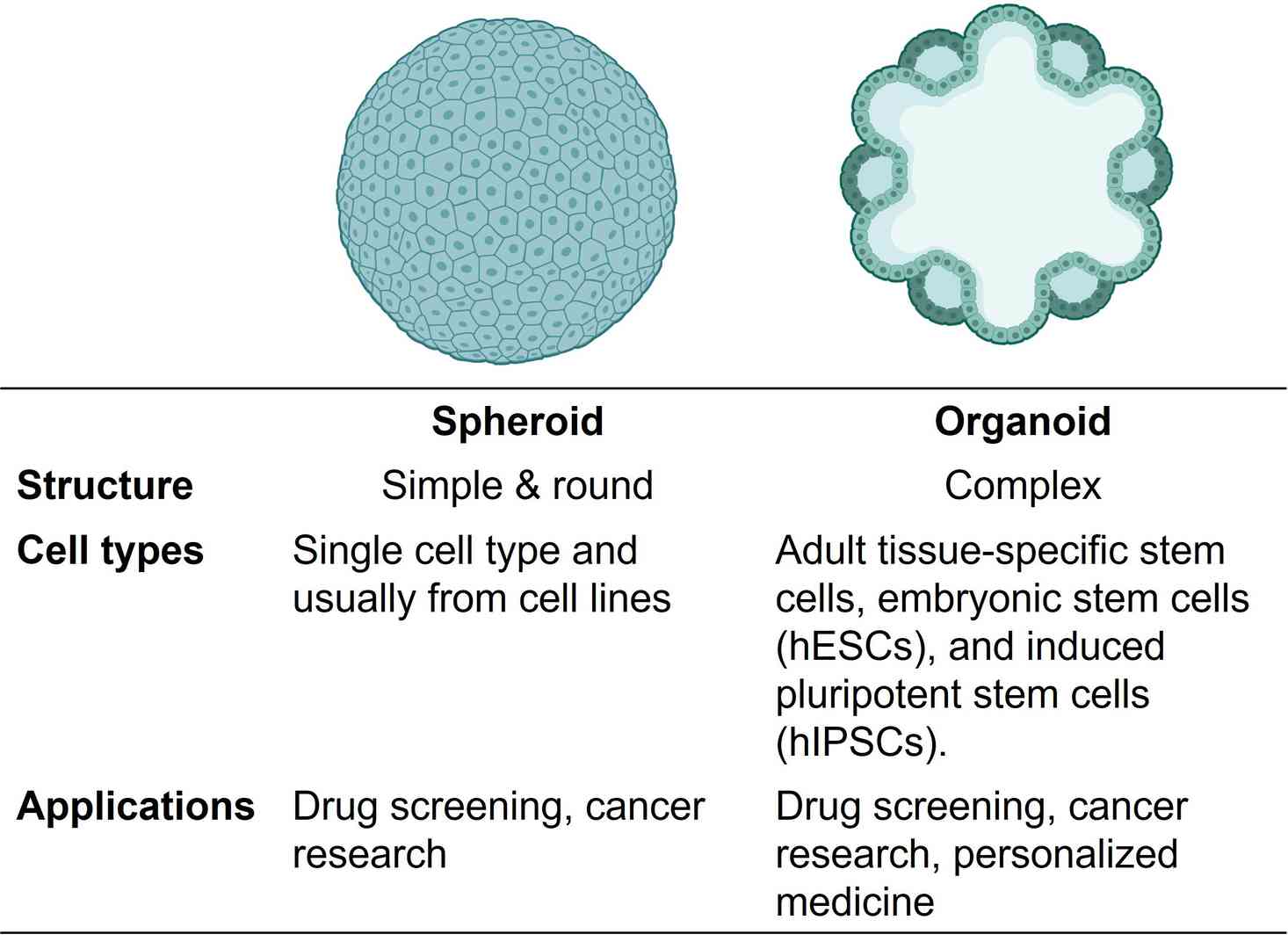- You are here: Home
- Applications
- 3D Spheroid & Organoid Culture
Applications
-
Cell Services
- Cell Line Authentication
- Cell Surface Marker Validation Service
-
Cell Line Testing and Assays
- Toxicology Assay
- Drug-Resistant Cell Models
- Cell Viability Assays
- Cell Proliferation Assays
- Cell Migration Assays
- Soft Agar Colony Formation Assay Service
- SRB Assay
- Cell Apoptosis Assays
- Cell Cycle Assays
- Cell Angiogenesis Assays
- DNA/RNA Extraction
- Custom Cell & Tissue Lysate Service
- Cellular Phosphorylation Assays
- Stability Testing
- Sterility Testing
- Endotoxin Detection and Removal
- Phagocytosis Assays
- Cell-Based Screening and Profiling Services
- 3D-Based Services
- Custom Cell Services
- Cell-based LNP Evaluation
-
Stem Cell Research
- iPSC Generation
- iPSC Characterization
-
iPSC Differentiation
- Neural Stem Cells Differentiation Service from iPSC
- Astrocyte Differentiation Service from iPSC
- Retinal Pigment Epithelium (RPE) Differentiation Service from iPSC
- Cardiomyocyte Differentiation Service from iPSC
- T Cell, NK Cell Differentiation Service from iPSC
- Hepatocyte Differentiation Service from iPSC
- Beta Cell Differentiation Service from iPSC
- Brain Organoid Differentiation Service from iPSC
- Cardiac Organoid Differentiation Service from iPSC
- Kidney Organoid Differentiation Service from iPSC
- GABAnergic Neuron Differentiation Service from iPSC
- Undifferentiated iPSC Detection
- iPSC Gene Editing
- iPSC Expanding Service
- MSC Services
- Stem Cell Assay Development and Screening
- Cell Immortalization
-
ISH/FISH Services
- In Situ Hybridization (ISH) & RNAscope Service
- Fluorescent In Situ Hybridization
- FISH Probe Design, Synthesis and Testing Service
-
FISH Applications
- Multicolor FISH (M-FISH) Analysis
- Chromosome Analysis of ES and iPS Cells
- RNA FISH in Plant Service
- Mouse Model and PDX Analysis (FISH)
- Cell Transplantation Analysis (FISH)
- In Situ Detection of CAR-T Cells & Oncolytic Viruses
- CAR-T/CAR-NK Target Assessment Service (ISH)
- ImmunoFISH Analysis (FISH+IHC)
- Splice Variant Analysis (FISH)
- Telomere Length Analysis (Q-FISH)
- Telomere Length Analysis (qPCR assay)
- FISH Analysis of Microorganisms
- Neoplasms FISH Analysis
- CARD-FISH for Environmental Microorganisms (FISH)
- FISH Quality Control Services
- QuantiGene Plex Assay
- Circulating Tumor Cell (CTC) FISH
- mtRNA Analysis (FISH)
- In Situ Detection of Chemokines/Cytokines
- In Situ Detection of Virus
- Transgene Mapping (FISH)
- Transgene Mapping (Locus Amplification & Sequencing)
- Stable Cell Line Genetic Stability Testing
- Genetic Stability Testing (Locus Amplification & Sequencing + ddPCR)
- Clonality Analysis Service (FISH)
- Karyotyping (G-banded) Service
- Animal Chromosome Analysis (G-banded) Service
- I-FISH Service
- AAV Biodistribution Analysis (RNA ISH)
- Molecular Karyotyping (aCGH)
- Droplet Digital PCR (ddPCR) Service
- Digital ISH Image Quantification and Statistical Analysis
- SCE (Sister Chromatid Exchange) Analysis
- Biosample Services
- Histology Services
- Exosome Research Services
- In Vitro DMPK Services
-
In Vivo DMPK Services
- Pharmacokinetic and Toxicokinetic
- PK/PD Biomarker Analysis
- Bioavailability and Bioequivalence
- Bioanalytical Package
- Metabolite Profiling and Identification
- In Vivo Toxicity Study
- Mass Balance, Excretion and Expired Air Collection
- Administration Routes and Biofluid Sampling
- Quantitative Tissue Distribution
- Target Tissue Exposure
- In Vivo Blood-Brain-Barrier Assay
- Drug Toxicity Services
3D Spheroid & Organoid Culture
3D cell culture is a technique used in cell biology to grow and study cells in a three-dimensional environment that more closely mimics the natural conditions found in the body. Traditional 2D cell culture methods involve growing cells on flat surfaces like petri dishes or flasks, but 3D cell culture can better model the behavior of cells in diseases such as cancer, where the interactions between different cell types within a tumor are crucial for understanding tumor growth and progression. By providing a more physiologically relevant environment for cells to grow and interact, 3D cell culture can help researchers better understand disease mechanisms and develop more effective treatments.
What are the applications of 3D cell culture?

3D spheroid and organoid culture
3D cell culture is essential for the growth and maintenance of spheroids and organoids. Although the terms "spheroids" and "organoids" are frequently used interchangeably, there is a significant distinction between the two. Spheroids are simpler structures that are spherical in shape and typically consist of a single cell type. On the other hand, organoids are more complex entities that encompass a variety of cellular phenotypes, closely resembling miniature organs.
3D spheroids and organoids models are used in various fields of research, including drug discovery, regenerative medicine, and disease modeling. They are valuable tools for studying complex biological processes and understanding how different cell types interact in a more physiological environment.
What is the difference between 3D spheroid and organoid?

Creative Bioarray offers a comprehensive range of products and services for 3D spheroid and organoid culture, enabling researchers to create more physiologically relevant in vitro models. Our specialized culture media and scaffolds support the growth and development of multicellular structures, while our organoid culture kits allow the establishment and maintenance of organoid models derived from various tissues and cell types. These advanced culture systems are ideal for drug screening, disease modeling, and personalized medicine applications.
Moreover, our drug testing platform integrates 3D spheroid and organoid culture models with high-throughput screening technologies to assess the efficacy and safety of pharmaceutical compounds. By mimicking in vivo environments, our innovative solutions provide more predictive results for drug development and toxicity testing.
3D Spheroid & Organoid Culture Reagents
3D Spheroid Platform for Drug Development
Organoid Platform for Drug Development
Organ-on-a-Chip Platform for Drug Development
Genetic Engineering in Organoids
Explore Other Options
For research use only. Not for any other purpose.

